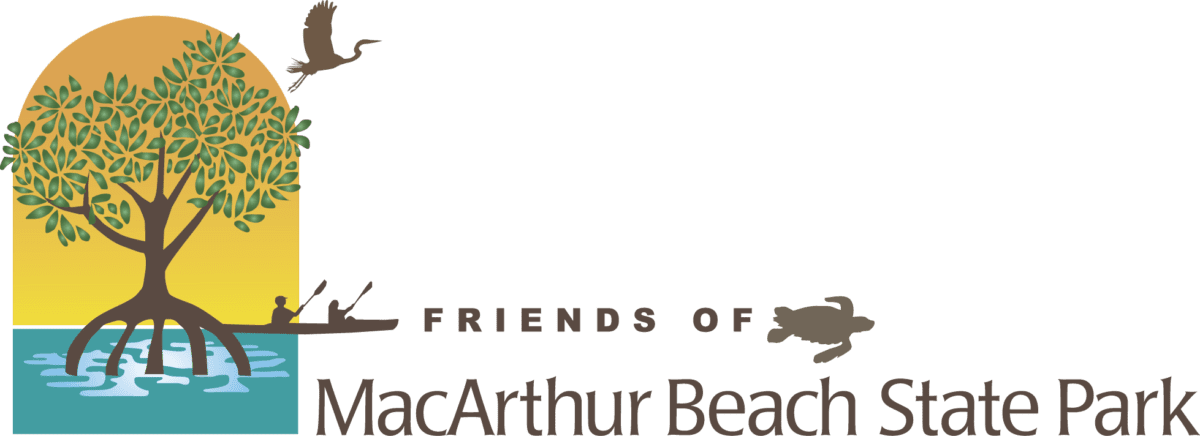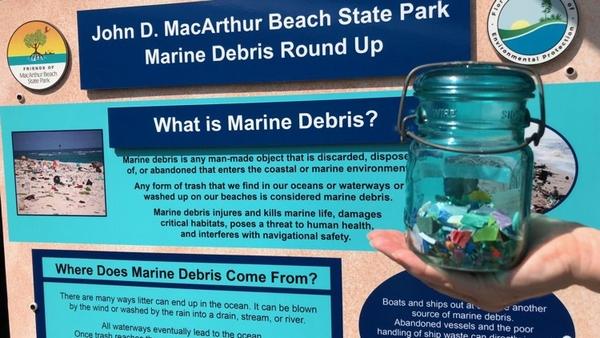In the first three days of a hands-on “citizen science” project, MacArthur Beach State Park visitors picked up more than 16 1/2 pounds of trash that was cluttering up the ocean.
Here’s how it works: Park guests grab a bucket and gloves from the nature center and head to the beach, where they pick up the bits of bottles and cans, plastic bags and fishing line littering the shore.
When they’re finished, they bring the bucket back to the nature center and weigh the trash they’ve collected. The park will share the data with the Solid Waste Authority, National Oceanic and Atmospheric Administration and The Ocean Conservancy.
All of that trash is a hazard to marinelife such as turtles, wading birds and fish. Sea turtles often mistake balloons and plastic bags for jellyfish, and turtle hatchlings swallow tiny plastic shards. The plastic waste blocks their digestive tracts, which can lead to starvation and death.
All of the dead or nearly dead hatchlings brought to the Loggerhead Marinelife Center in Juno Beach last year had plastic in their guts.
And there’s a good chance that the plastic fish swallow could end up inside of people who eat the fish, Director of Education Veronica Frehm said.
The push to pick up plastics and other marine debris at MacArthur comes as Jupiter considers banning restaurants from automatically handing out plastic straws.
“All of the education is bubbling up to the surface. People are starting to realize how their actions are making a difference,” Frehm said.
Friends of MacArthur Beach State Park started a new Citizen Science Project encouraging people to collect marine debris – trash and recyclables – littering the beach. When visitors bring buckets of debris back to the nature center, the debris is weighed. The little jar is full of microplastics, small pieces of broken down plastic that marine animals often mistake for food. The park will send the data to the Solid Waste Authority, NOAA and The Ocean Conservancy. Photo courtesy of Friends of MacArthur Beach State Park
The park does similar programs with the students who visit on school field trips, but the staff wanted to involve visitors of all ages. The program is made possible with the help of a grant from the Community Foundation for Palm Beach and Martin Counties.
Many people who visit the park already have some knowledge of the problem, Frehm said. But even educators who did a field test of the project were surprised by a sign at the park displaying plastic items such as cigarettes that last for hundreds of years.
The new citizen science project also comes amid growing awareness of the Great Pacific Garbage Patch halfway between California and Hawaii. The patch full of plastic straws, bags, water bottles and other debris is estimated to be twice the size of Texas. It’s featured on one of MacArthur’s signs about the new citizen science project.
The park does get a little bit of debris from visitors, but most of the litter — bottles, bags, flip flops and even toothbrushes — is washing up. Volunteers have even found a snack bag with Japanese writing on it and a chip bag from Singapore, Frehm said.
“The animals that live in our waters and on our beach depend on healthy ecosystems. They depend on us to be responsible stewards,” she said.
If each visitor picked up one item, 162,500 pieces of trash would leave the beach each year, Friends of MacArthur Beach State Park Executive Director Cheryl Houghtelin said.
The park is hoping to continue the program in perpetuity.
“I can’t see this as a problem that’s going to go away quickly,” Houghtelin said.
https://www.palmbeachpost.com/news/local/local-park-takes-hands-approach-fight-against-plastic-ocean/A88rs2MbdHp0QDknszsnbJ/

